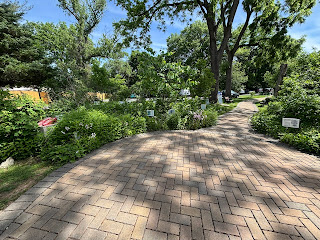 |
Photo: Montgomery County
Office of Agriculture |
By MG Intern Cally Neely
As food waste becomes a major contributor to methane production and pollution when thrown into landfills and incinerators, the need to get involved in composting safely to divert community-generated food scraps and support the soil becomes more and more important.
This past March, six Montgomery County Master Gardeners (along with five non-MGs) completed the pilot Montgomery County Extension Composter Course, which entailed 12.5 hours of virtual course work and in-person training at the Agricultural History Farm Park in Derwood, Maryland. The course drew together 11 participants from across Maryland (Montgomery, Prince George’s, and Howard Counties) as well as DC for three Saturdays in a row to learn about and make compost together with a host of speakers and the compost trainer Thomas Fazio (Compost Manager at ECO City Farms).
The program was hosted by the Institute for Local Self-Reliance (ILSR) in collaboration with University of Maryland Extension (UME), MCMG, the Montgomery County Office of Agriculture (OAG), and Thomas Fazio. Three in-person training days allowed participants to build competency via hands-on practice, and receive the basic training needed to support the Composting Education Hub (CEH) while learning how to serve composting needs across their residential communities.
The course began indoors with an orientation session, followed by speakers Eileen Kao and Kathy Vasquez from Montgomery County’s Department of Environmental Protection (DEP), who provided information about composting rules, regulations, goals, and existing programs in Montgomery County and Maryland, as well as the pros and cons of the DEP-recommended backyard composting systems. The day ended with a brief tour of the CEH.
 The first day of the hands-on practicum began with home composting basics led by ILSR’s Composting for Community Initiative Director Brenda Platt, followed by an in-depth introduction to the CEH’s three-bin Knox compost system, led by instructors Thomas Fazio and Natalia Salazar (OAG). Fazio guided the participants in building their own hot compost pile with food scraps provided by the local Manna Food Center, and demonstrated ways to get important metrics such as bulk density and moisture levels, as well as methods of troubleshooting a pile.
The first day of the hands-on practicum began with home composting basics led by ILSR’s Composting for Community Initiative Director Brenda Platt, followed by an in-depth introduction to the CEH’s three-bin Knox compost system, led by instructors Thomas Fazio and Natalia Salazar (OAG). Fazio guided the participants in building their own hot compost pile with food scraps provided by the local Manna Food Center, and demonstrated ways to get important metrics such as bulk density and moisture levels, as well as methods of troubleshooting a pile.
 |
Three-bin compost system
Photo: Montgomery County
Office of Agriculture
|
The final day of the hands-on practicum included taking the CO2 measurements of the week-old pile, and mixing it with an older pile to build volume to achieve temperatures that would destroy most pathogens. Fazio ended his portion with a sensory exploration of compost of different stages, getting participants to see, smell, and feel different stages of compost samples taken from ECO City Farms. This was followed by speakers from Baltimore’s Hidden Harvest Farm (Aleksandra Mihailovic & Dana Rushovich) explaining other methods of running an all volunteer-run composting operation, and the session finished up with teaching tips for engaging the audience and volunteering using your strengths led by MG Susan Eisendrath.
The participants, who ranged from MCMGs to unaffiliated individuals interested in composting in their own communities, brought lively questions and dove into creating compost together, with many expressing interest in volunteering at the CEH. All 11 students passed the post-course knowledge check, earning them a certificate of completion.
To support the replication of this training in other counties as well as in other state Extension programs, ILSR developed a toolkit to be made available to the UME and MG volunteers which will include a description of the CEH site development; the 2025 pilot course curriculum and schedule; various checklists for supplies needed to run the program with best management practices (including health and safety considerations); and form templates (media release, pre- and post-assessments, liability waiver, feedback form).








